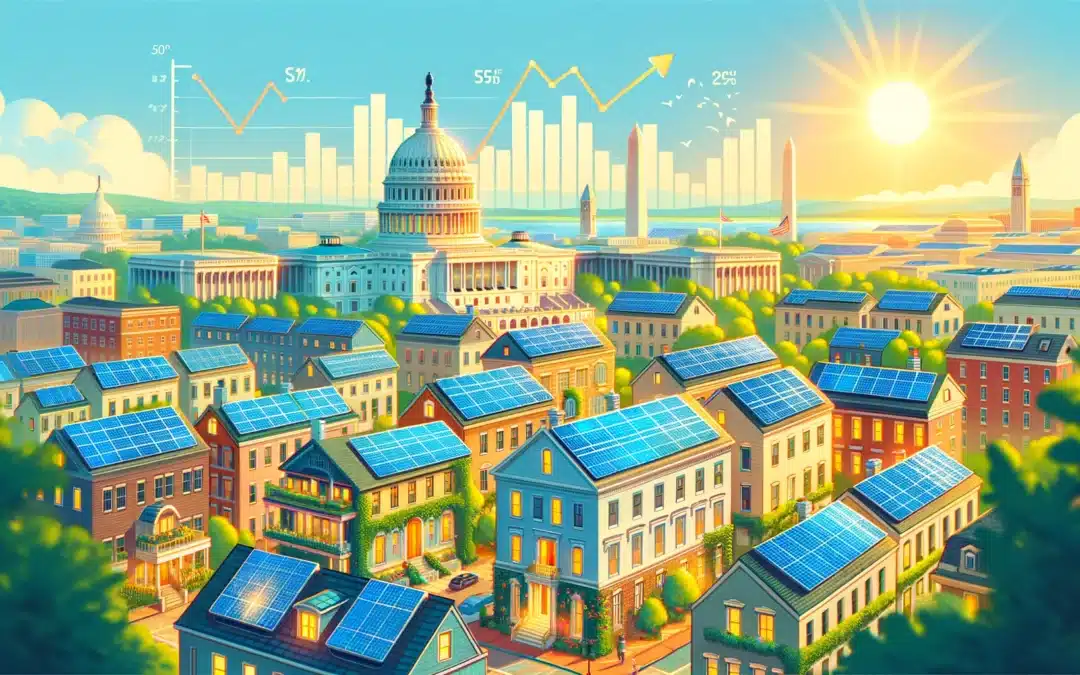As Washington, DC strives toward its ambitious clean energy goals, Mayor Bowser’s recent budget proposal for Fiscal Year 2024 and 2025 proposes policy changes that could do serious damage to the local solar landscape by causing DC’s Solar Renewable Energy Credits (SRECs) to lose value or even crash. SRECs serve as DC’s local incentive for solar energy production, significantly accelerating the payback period for solar investments. This proposal is especially impactful for condominiums and cooperative associations in the District that currently benefit from or are considering investing in solar energy systems, which can be helpful in complying with new Building Energy Performance Standards (BEPS). If you’re a resident benefiting from these programs, or if you aspire to support clean energy, energy equity and energy efficiency incentives in DC, please click here to tell your Councilmembers to halt this decision from moving forward.
What’s Changing?
- Exemption from Renewable Portfolio Standard (RPS): The mayor’s proposal aims to exempt the District government’s electricity load from the Renewable Portfolio Standard (RPS). The Mayor’s proposed budget saves the District money by effectively exempting the District government from its own RPS market participation. Specifically, she is proposing to amend the District’s electricity supply contract with WGLES (the electric supplier) to direct them NOT to meet the RPS with SRECs but just to pay the ACP noncompliance fees instead. The Mayor includes a proposed amendment in the Budget Support Act to redirect any ACP fees the government pays back into to the General Fund. You can see this in the Fiscal Impact Statement (p. 32/33) accompanying the Budget Support Act (See Sec. 6012(b) on page 66 for revision to the ACP (REDF) fund uses).
- Likely Sharp Decline in SREC Values: With the District government stepping back from the SREC market, one of the largest buyers is removed, pushing demand and SREC price downward. This price drop can decrease the financial returns for entities that have invested in solar technologies relying on SREC sales for part of their return on investment.
- Impact on Condos and Coops:
- Owned Systems: Condos and coops that own their solar installations and rely on selling SRECs will likely see reduced revenue due to falling SREC prices.
- PPA and Roof Lease Agreements: Solar financing companies often include mechanisms in Power Purchase Agreements and Roof Leases allowing for termination or modification in response to significant political or economic changes. Many condos and coops rely on their solar systems to comply with energy regulations like DC’s Building Energy Performance Standards (BEPS). Those with Power Purchase Agreements (PPA) or Roof Leases might face adjustments in their contract terms. If SREC values fall, solar contracts can be terminated. If not terminated, PPA rates may increase, reducing savings on electricity bills, or annual lease payments could decrease, affecting the revenue expected from hosting solar panels.
- Upfront Roof Lease Payments: Associations that have already contracted for upfront payments in roof lease agreements might not experience immediate financial impacts from the proposed changes. It’s important to review the details of your solar contract to determine if your association could be affected by this policy change. The overall attractiveness and financial viability of new solar projects in their community might diminish, potentially impacting property values and future decisions on solar investments.
Why Should You Care?
The proposed budget changes threaten not just the financials but also the broader goals of energy equity and sustainability in DC. Programs like Solar for All, which have benefited many low and moderate-income households by halving their electricity bills for 15 years, are at risk of defunding along with other low and moderate-income energy efficiency incentives that normally cover up to 100% of upgrade costs. This backslide not only impacts current solar users but also potential adopters and buildings in need of incentives to be able to afford building improvements for BEPS compliance, slowing down DC’s progress towards its clean energy and energy efficiency targets.
What Can You Do?
Your voice is crucial in shaping how these policies evolve. By engaging with DC Councilmembers and expressing the importance of sustaining clean energy incentives, you can help ensure that the city does not regress on its path to a sustainable future.
Join the Call to Action
If you’re a resident benefiting from these programs, or if you aspire to support clean energy in DC, your story can make a difference. Click here to tell your Councilmembers to protect and prioritize clean energy and energy equity programs.
Act Now: Participate in community forums, reach out to your representatives, and encourage your neighbors to express their concerns. Your involvement can drive the council to reconsider and hopefully reverse these detrimental budgetary changes.
Together, we can maintain Washington, DC’s leadership in clean energy and ensure that our condos and coops continue to thrive in a green economy.

